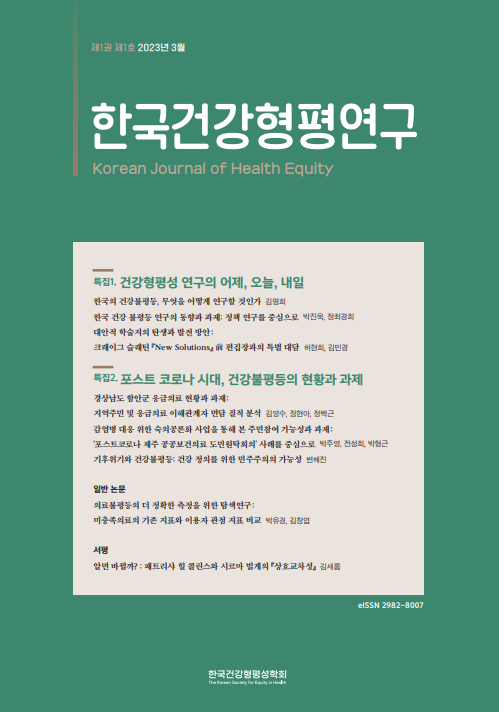- ENGLISH
- E-ISSN2982-8007
젠더 관점에서 본 한부모 건강의 사회적 결정요인에 관한 질적 연구
A Qualitative Study on Social Determinants of Health among Single Parents from a Gender Perspective
초록
본 연구는 한부모 건강을 형성하는 사회적 결정요인을 젠더 관점에서 교차적으로 분석하 였다. 한부모 여성과 남성(n=8)을 목적적으로 표집해 2022년 9월부터 10월까지 온라인으로 개 별 심층 인터뷰했으며 귀납적 주제분석을 사용했다. 연구 결과, 젠더화된 차별과 낙인의 맥락 에서 다차원의 억압체계가 교차하며 한부모의 건강불평등에 영향을 미치는 것으로 나타났 다. 정상가족 이데올로기, 섹슈얼리티, 남성성 규범이 젠더불평등의 사회구조적 맥락을 구성 했다. 한부모 건강에 영향을 미치는 중요한 사회적 결정요인은 ‘유급 일터 노동’, ‘무급 돌봄 노 동’, ‘빈곤’, ‘보건의료체계의 편향’으로 드러났다. 유급 일터 노동과 무급 돌봄 노동이 맞물려 서 로의 조건을 제한하면서 빈곤을 지속적으로 심화했고, 편향적인 보건의료체계의 요인과 교차 하였다. 연구 결과는 유급노동을 중요하게 다루면서도 사적 영역으로 간주하는 무급돌봄노동 의 영향력을 비가시화하는 기존 건강의 사회적 결정요인 개념틀의 한계점을 드러내며, ‘사회 적 결정요인으로서 젠더 역할 분석틀’의 추상성을 구체화할 수 있는 근거를 제공한다. 건강의 사회적 결정요인에 대한 젠더 관점이 갖는 이론적 함의와 함께 한부모의 건강불평등을 완화 할 수 있는 정책적, 실천적 방안을 제언하였다.
- keywords
- 건강의 사회적 결정요인, 한부모, 젠더, 교차성, 건강불평등
Abstract
This study analyzed the intersectionality of the social determinants that shape health among single parents from a gender perspective. Single parent women and men (n=8) were purposively sampled and individually interviewed online from September to October 2022, using inductive thematic analysis. Findings revealed that multidimensional systems of oppression intersect in the context of gendered discrimination and stigma to influence health inequities among single parents. Normal family ideology, sexuality, and masculinity norms constituted the sociostructural context of gender inequalities. The key social determinants of health among single parents were identified: “paid work”, “unpaid care work”, “poverty”, and “bias in health care system”. Paid work and unpaid care work interacted to constrain each other's conditions, perpetuating poverty and intersecting with biased health care system. The results highlight the limitations of pre-existing conceptual frameworks of social determinants of health, which emphasize paid work while invisibilizing the impact of unpaid care work, which is considered to be private, and provide a basis for refining the abstractions of the “Framework for the role of gender as a social determinant of health.” The theoretical implications of a gender perspective on the social determinants of health are discussed, along with policy and practice recommendations for reducing health inequities among single parents.
- keywords
- Social determinants of health, Single parents, Gender, Intersectionality, Health inequities
- 투고일Submission Date
- 2024-01-19
- 수정일Revised Date
- 2024-02-20
- 게재확정일Accepted Date
- 2024-02-22
- 다운로드 수
- 조회수
- 0KCI 피인용수
- 0WOS 피인용수



